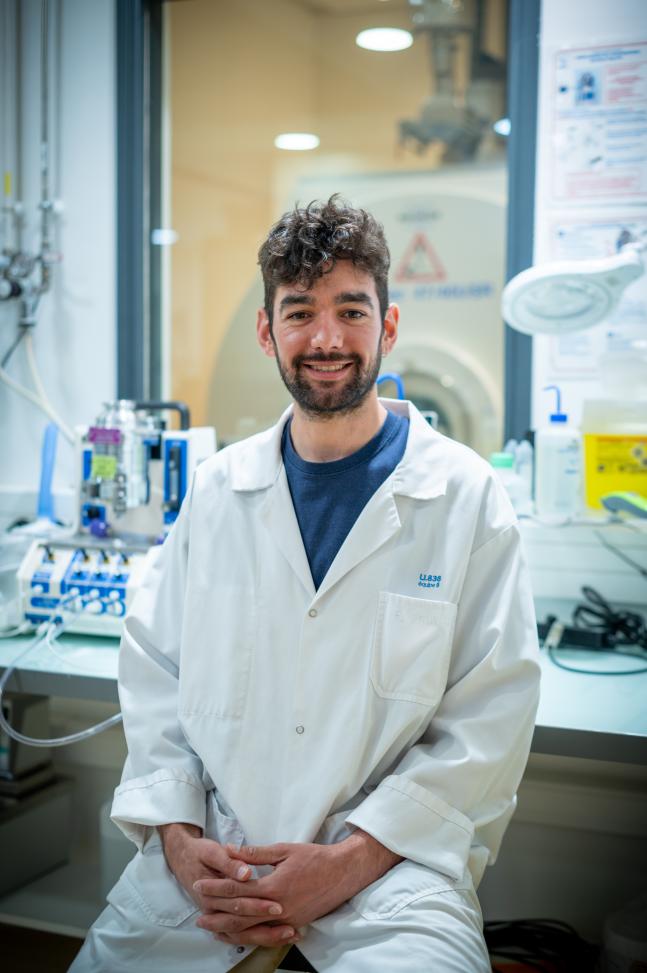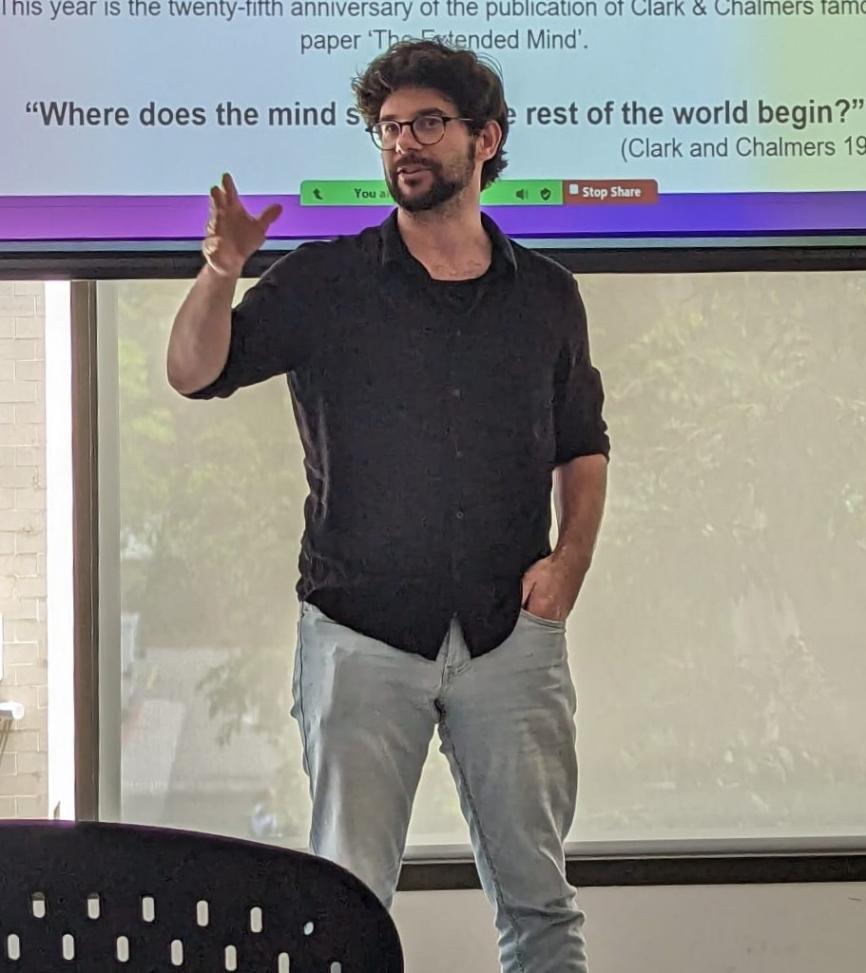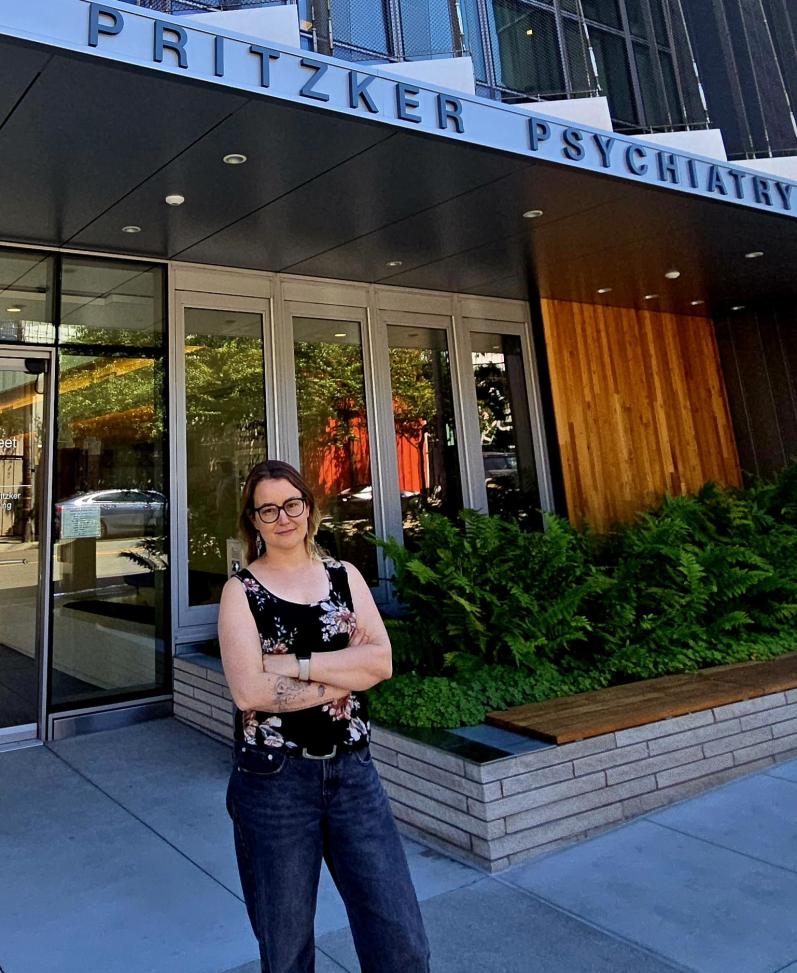- Imprimer
- Partager
- Partager sur Facebook
- Partager sur X
- Partager sur LinkedIn
Quelles sont les missions principales du COSJUN ?
- Animation scientifique interdisciplinaire via l'organisation des séminaires du LabEx CerCoG (choix des thématiques et des intervenants, gestion événementielle...)
- Diffusion des connaissances et vulgarisation scientifique tout public via la production de supports de communication originaux et accessibles (podcasts...)
- Création de liens au sein de la communauté par l'intégration des jeunes chercheurs.chercheuses
Composition 2025/2026
Sébastien Rigollet, Ph.D, post-doctorant GIN et STROBE
En trois mots, je suis... curieux, réfléchi et équilibré

Actuellement en post-doc au GIN et à STROBE, je travaille sur des nouvelles combinaisons de traitement pour le glioblastome couplant ultrasons focalisés (FUS) et radiothérapie. Après une école d'ingénieur, j'ai fait ma thèse au GIN sous la direction d'Emmanuel Barbier et Chantal Pichon sur l'impact de la perméabilisation de la barrière hémato-encéphalique (BHE) par FUS sur le cerveau et plus particulièrement ses propriétés microvasculaires et les réponses neuroinflammatoires. Je m'intéresse de manière générale à l'utilisation des FUS pour les tumeurs du système nerveux central, ses effets sur le tissu sain et tumoral, mais aussi la combinaison de cette modalité de traitement avec d'autres thérapies innovantes.
Célia Bertin, Ph.D student LPNC
Contenu...
En trois mots, je suis... Inventive, polyvalente, logique
Actuellement doctorante au LPNC à L’Université Savoie Mont Blanc, je m'intéresse au sommeil paradoxal (REM sleep) et plus particulièrement sa microstructure qui fait l'objet d'un intérêt scientifique croissant. Mon travail, encadré par Jean-Baptiste EICHENLAUB et Pascal HOT, vise à caractériser cette microstructure et son évolution au cours de la vie, dans le vieillissement normal et pathologique, à l'aide de larges cohortes de données rétrospectives.
Anna Trevisan, Ph.D student au GIN
En trois mots, je suis... Solaire, altruiste, méticuleuse,

Après avoir obtenu mon diplôme à l'université de Trente, en Italie, j'ai commencé mon doctorat dans le groupe de Frédéric Saudou au GIN. Mes recherches visent à comprendre le rôle et le dysfonctionnement du transport axonal dans la maladie neurodégénérative de Huntington.
Nicolas Crozatier, Ph.D à l'IPhiG
En trois mots, je suis... Philosophe enthousiaste et bienveillant !

Doctorant en cotutelle à l’Institut de Philosophie de Grenoble (IPhiG-UGA) et à Macquarie University (Sydney) sous la direction de Kourken Michaelian et de Neil Levy. Titulaire d’un master en philosophie puis d’un master en sciences cognitives, mes recherches se situent à l'intersection de la philosophie des technologies, de l'éthique et des sciences cognitives. Mon travail de thèse porte plus particulièrement sur l'impact des technologies émergentes sur la mémoire humaine à travers l’étude des prothèses cognitives tant dans leurs applications thérapeutiques que dans leur potentiel d'amélioration cognitive. Mes travaux s’inscrivent dans le cadre théorique de la cognition étendue considérant l'environnement comme constitutif des processus cognitifs et affectifs, le tout en combinant analyse philosophique, recherche empirique et questionnement éthique.
Anaëlle Bain
Contenu...
Vaëa Tesan
Contenu...
Arnaud Pouchon, psychiatre et Docteur en Neurosciences

Psychiatre au sein du service de psychiatrie de l’adulte du Centre Hospitalier Universitaire Grenoble-Alpes, je dirige une unité consacrée aux traitements par neuromodulation, ayant pour activité des prises en charge validées cliniquement (électroconvulsivothérapie, stimulation magnétique transcrânienne répétitive accélérée et robotisée, traitements par kétamine et esketamine), ainsi que des protocoles de recherche (stimulation magnétique transcrânienne, stimulation électrique transcrânienne, stimulation du nerf vague, stimulation cérébrale profonde). Mon activité clinique est partagée entre l’hôpital de jour de cette unité et les consultations spécialisées dans la prise en charge des dépressions résistantes ou d’autres troubles psychiatriques nécessitant un traitement par neuromodulation. Je réalise également des consultations spécialisées dans les troubles bipolaires au sein du centre expert des troubles bipolaires.
Après une thèse de doctorat en neurosciences sous la supervision du Pr Mircea Polosan et du Dr Julien Bastin au Grenoble Institut des Neurosciences (GIN), puis un post-doctorat sous la direction du Pr Fabien Vinckier à l’Institut du Cerveau (ICM) à Paris au sein de l’équipe Motivation, Brain and Behavior, je poursuis actuellement mon activité de recherche au GIN, dans l’équipe Brain, Behavior and Neuromodulation dirigée par le Dr Julien Bastin. J’étudie les altérations de la motivation et du traitement de la récompense dans les troubles de l’humeur (troubles bipolaires et dépression), en utilisant pour cela des tâches comportementales, de la modélisation neuro-computationnelle, ainsi que de l’imagerie cérébrale. L’objectif est de mieux comprendre la physiopathologie de ces troubles, d’identifier des biomarqueurs prédictifs de la réponse aux traitements et de développer des stratégies de prise en charge personnalisées, notamment par neuromodulation.
En plus de mes activités cliniques et de recherche, mon statut hospitalo-universitaire de praticien hospitalier universitaire (PHU) me permet également d’assumer une charge d’enseignement à l’Université Grenoble-Alpes, principalement à la Faculté de médecine, où j’interviens dans la formation initiale et continue en psychiatrie.
Audrey Kist, Ph.D, postdoctorante au Grenoble Institut des Neurosciences
En trois mots, je suis... une exploratrice, rigoureuse et responsable !

Je suis chercheuse postdoctorante en neurosciences cognitives au GIN et j’étudie les mécanismes des troubles psychiatriques et neurologiques, sous la direction de Brigitte Piallat. Après un doctorat à l’Université Grenoble Alpes en codirection LPNC-GIN, puis un postdoctorat à l’University of California, San Francisco dans le département de psychiatrie et le Weill Institute for Neurosciences, je travaille sur la personnalisation de la stimulation cérébrale profonde à partir de marqueurs électrophysiologiques invasifs, selon une approche en boucle fermée (stimulation adaptative). Mon objectif est d’identifier des biomarqueurs permettant d’ajuster la stimulation en temps réel afin d’en optimiser l’efficacité thérapeutique.
Mes recherches combinent approches comportementales, enregistrements électrophysiologiques (EEG, sEEG et potentiels de champ locaux intracérébraux), modélisation des processus décisionnels, ainsi que l’utilisation de trackers électroniques (bague, montre connectée) pour des mesures écologiques en conditions de vie réelle. Je développe également un nouveau projet intégrant des enregistrements de vidéo-polysomnographie afin d’explorer les liens entre activité cérébrale, sommeil et fonctionnement cognitif dans la maladie de Parkinson. Je m’intéresse plus particulièrement aux symptômes non moteurs et aux interactions entre activité cérébrale, confiance, prise de décision et états affectifs, dans l’objectif d’identifier de nouvelles pistes thérapeutiques pour les troubles neurocognitifs.
J’interviens également à l’Université Grenoble Alpes en travaux dirigés dans les cursus de Psychologie, et de Mathématiques et Informatique Appliquées aux Sciences Humaines et Sociales.
Salomé Lippolis, Ph.D student au GIN
En trois mots, je suis... consciencieuse, appliquée et déterminée
Doctorante à l’Institut des Neurosciences de Grenoble (GIN) sous la direction de Mircea Polosan et de Mario Hervault, je travaille sur le lien entre le cerveau et le comportement, en particulier sur l’inhibition des pensées intrusives chez les patients qui souffrent de Troubles Obsessionnels Compulsifs. Notre objectif est d’évaluer les marqueurs comportementaux et électrophysiologiques du contrôle inhibiteur des pensées chez ces patients, afin de mieux comprendre la pathologie et, à terme, pouvoir développer de nouvelles solutions thérapeutiques. Ce projet de recherche se situe à l'interface entre la recherche clinique et la recherche fondamentale et s'inspire de l'interaction entre ces deux dimensions.
Alexis ROBIN, neurologue au CHUGA et Ph.D student au GIN
Je suis neurologue au CHUGA, spécialisé dans l'épilepsie et plus particulièrement dans les bilans préchirurgicaux des épilepsies focales pharmacorésistantes et notamment la réalisation de Stéréoélectroencéphalographie.
Je suis rattaché au GIN pour mes travaux de recherche avec de multiples thématiques, entre autre : les épilepsies insulo-operculaires, les enregistrements par microélectrodes, les phénomènes expérientiels... Je collabore également sur différents projets avec différentes équipes du GIN.
Je suis actuellement en 1ère année de thèse de sciences à l'EDISCE avec comme projet B2B qui vise à développer le 1er atlas cérébral fonctionnel des signes cliniques épileptiques.
Témoignages
Iels nous partagent ce que le COSJUN leur apporte : inspiration, réseau, expérience… et la richesse unique qu’iels apportent eux-mêmes à la communauté.
En organisant des séminaires interdisciplinaires, nous avons apporté des débats riches et, en retour, découvert de nouvelles thématiques et manières de travailler.
En assumant chacun des rôles différents et complémentaires – interviewer, organiser, improviser – nous avons appris à gérer l’imprévu et à valoriser nos compétences collectives.
En contribuant à la communication via des supports "NewGen" (séminaires aux thématiques actuelles, interviews décalées...), nous avons donné de la visibilité au LabEx CerCoG et développé nos compétences en vulgarisation. »
En mobilisant nos propres réseaux, nous avons apporté de nouveaux visages (jeunes chercheurs.chercheuses +++)et renforcé nos propres connexions pour préparer notre avenir professionnel.
Nos anciens membres
- Imprimer
- Partager
- Partager sur Facebook
- Partager sur X
- Partager sur LinkedIn